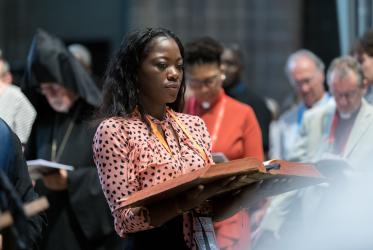By the Rev. Dr Olav Fykse Tveit, general secretary of the World Council of Churches
Dear sisters and brothers in Christ!
There are some moments in our lives when we realize, in a very special way, that we are participating in the triune God’s mission in the world. To be here in Edinburgh today is one of them. This makes me feel both humble and thankful.
Today in the World Council of Churches we give thanks to God for how this hundredth anniversary of the contemporary ecumenical movement brings us back to where we came from and sends us out to where we need to be. Whether you come from churches and mission movements linked to the WCC or not, together we can give thanks to the Holy Spirit for assembling such a wide spectrum of disciples of Jesus Christ in today’s world.
We who are in Edinburgh today participate in the same prayer as those who were here 100 years ago. I read from the Gospel of John, chapter 17, verse 21 – and please take note of the poetic structure in these wonderful words:
I ask not only on behalf of these,
But also on behalf of those who will believe in me through their word,
That they may all be one.
As you, Father, are in me and I am in you,
May they also be in us
So that the world may believe that you have sent me.
These words remind us why they were here then and why we are here now. Mission and unity belong together. To be one in Christ is to witness together to Christ. We have a foundation going deeper than ourselves, our institutions or our traditions. We have a call which goes wider than our plans. We are called to witness that the crucified and risen Christ was sent by God for our salvation, that Jesus Christ really has the power to forgive sins, to reconcile and heal, to change lives, individually and collectively, to make the church one, and to bring peace and justice to the world.
These words of Christ's prayer are not only a reminder to us. They also transform us as we are here together, drawing us together as churches into communion with Christ in the triune God. “May they all be one” is parallel to “May they also be in us.”
What comes immediately after these words in John's Gospel is the story of Jesus' passion and cross. This story is about how all the disciples left him – betraying, denying, and abandoning Jesus Christ. Yet these are the ones who will later receive the words from the risen Christ: “As the Father has sent me, so I send you” (John 20:21).
This means that if there is to be a witness to Christ, there must be a mission movement of the cross. This means that if there is a will to be one in Christ, there must be an ecumenical movement of the cross. Nobody needs triumphalistic movements and churches. The world needs faithful disciples of Christ, always carrying the cross in love and solidarity with the world for which Christ died.
Christ has called us to witness, to share the gifts of God with one another and with the world, in love and compassion for all human beings and for the whole of creation.
Christ has called us to carry the cross together, to bear the burdens of one another, to share the burdens of our failures and our shortcomings in being one and witnessing together, to learn and to take new steps forward together.
Christ has called us to be good neighbours to all human beings, wherever they are, whatever faith they might have – or not have, to be sensitive and respectful to all who are created in the image of God.
Christ has called us to be peacemakers, to share in the burden of suffering in this world and to fight against violence and injustice.
Many more sectors of world Christianity now take their inspiration from the deliberations of the 1910 Edinburgh conference than those who actually participated in the event. At its meeting in 1951 the WCC central committee stated: “It is important to insist that (the word ‘ecumenical’)...is properly used to describe everything that relates to the whole task of the whole Church to bring the Gospel to the whole world.”
Let me share a personal word with you. One of my deepest joys following my election as general secretary was that I have been reminded just how much the meaning of the World Council of Churches is defined by God’s mission. Among the greetings I particularly remember one from some Christians in India and from Cardinal Kasper of the Pontifical Council for Promoting Christian Unity, reminding me that they expected me to be a leader of the Church’s mission in the world. Among the visits I have received during these first months, I have very much appreciated those of the two leaders of the World Evangelical Alliance and the Lausanne Committee. It has been moving and inspiring for me to realize how deeply we share a holistic understanding of mission.
Let me also say that Unity and Mission were the two main streams which led to the formation of the World Council of Churches. This wisdom led the International Missionary Council (“the child of Edinburgh”) and the WCC to merge in 1961. It is important to keep a healthy dialectic and creative tension between the many dimensions of our calling. To witness to Christ is both evangelism and the prophetic stand for Christ’s will for justice, peace and care of creation. Christian mission is called to offer reconciliation to humanity – with God, with fellow human beings and with creation – a life that has the quality of the eternal life. The churches can be witnesses of hope in times of injustice, of financial crises, of violence and tensions between peoples of faith, and of environmental threats.
We know that these calls can in themselves be a cross to carry. Nevertheless, today as we come together in this place as a much wider constituency, we come to celebrate the progress of world Christianity over the last 100 years. We are also aware that many Christians do not feel represented here and we humbly acknowledge the limitations of this conference. Despite very positive developments, the past century has unfortunately experienced much hostility in mission, and we know this all too well.
There have also been many difficult lessons to learn. Our struggles with mission have included valid criticism towards different actors, a wide variety of reflections, as well as critical commentaries on the WCC’s work. We have all learned about the links between mission and colonialism, about shameful power struggles, and about the need for renewing the response to the Gospel in what used to be called Christian cultures. We are continuing to learn hard lessons about being sensitive to one another in mission. We cannot but reflect and wrestle with the problematic tensions mission can lead to, even with so many good intentions. We cannot ignore that mission is a challenging theme in our relations to people of other faiths.
In Edinburgh 1910 the world missionary movement already had a deep concern for common theological education as a joint task of all Christian churches. This is also a strategic question for the future of world Christianity in the 21st century. We are therefore grateful that we shall receive fruits of this work here in Edinburgh (through a book presented to us).
One hundred years after the Edinburgh conference in 1910 we are challenged to launch together a new beginning for common mission in the 21st century. We need to discern together what the call to carry the cross of Christ means for us today, as we witness together and find different ways to make it visible that we are called to be one.
This is the hope and prayer of the WCC for this conference.
It seems to me that the excellent work done through the study process offers common theological ground for such a call and hope.
May these days be moments when we realize in a new way that we are participating in God’s mission in the world, to the glory of God, the Father, the Son and the Holy Spirit.



